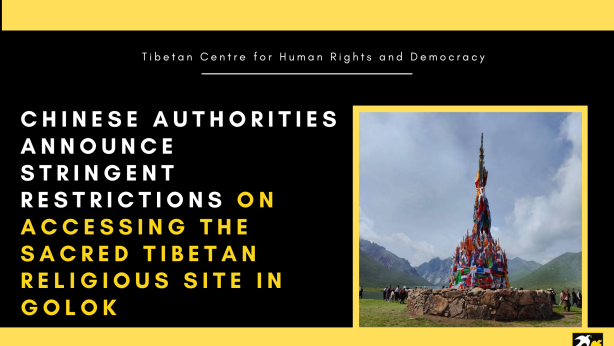Concerns over well-being of writer Dhi Lhaden despite release from prison
Writer Dhi Lhaden’s release following four years of confinement raises concerns over the uncertainty surrounding his physical and psychological well-being, compounded by the limited accessibility of information relating to his present circumstances.
In addition to media reports, TCHRD sources have confirmed the release of Lhaden and his return to his residence, an occasion met with much joy from fellow Tibetans. However, no immediate and comprehensive information can be obtained about his current physical and psychological condition due to heavy restrictions placed upon him and others to stop any information from being shared with outsiders.
Enduring two years of incommunicado detention since June 2019, he was secretly given a four-year prison sentence in 2021, encompassing the two-year incommunicado detention within the four-year prison term. Lhaden found himself detained under the vague charge of “disrupting social order,” an accusation often levelled against human rights defenders and activists. Despite being released in June of this year, the information about his release was delayed for two months. This delay can be seen as a manifestation of cautious measures taken by Chinese authorities, ostensibly restricting the spread of information about his release and current physical and psychological condition.
Writer Dhi Lhaden was deprived of a fair and impartial trial. Prior to his trial, he underwent an extended period of incommunicado detention, effectively severing all connections to family and legal representation. It is feared that during that time, he was subjected to diverse methods of coercion, including torture and duress, to compel his acquiescence to unfounded allegations.
Dhi Lhaden is a former monk, intellectual, and writer born in 1971 at Dida Village in Pema (Ch: Baima) County, Golok (Ch: Guoluo) Tibetan Autonomous Prefecture, Qinghai Province, in the Tibetan province of Amdo. Popularly known as Dhi Lhaden, his ordained name as a monk was Thubten Lobsang Lhundup. At the age of 13, he became a monk at his local monastery, and at 15, he joined the Larung Gar Buddhist Institute in Serta (Ch: Seda) County, Kardze (Ch: Ganzi) Tibetan Autonomous Prefecture, Sichuan Province. At 27, he travelled to Lhasa to pursue further studies at the Drepung and Sera monasteries but had to cut his studies short due to various obstacles.
For some years since 2008, he had travelled across Tibet to experience and record the observations of fellow Tibetans. His first book, titled Tsesok Le Trun Pe Kecha (”Words Uttered with Life at Risk”), was published by TCHRD in March 2011. The book was released to coincide with the third anniversary of the 2008 Mass Uprising in Tibet and the 16th session of the UN Human Rights Council in Geneva. His second book, titled Tungol Trimtug (”Resistance through Cooperation with Law”) initially, was translated and published as “The Art of Passive Resistance ” on 29 June 2015.
The Tibetan Centre for Human Rights and Democracy reiterates that Lhaden was punished for exercising his human rights, including articulating the hopes and aspirations of the Tibetan people and speaking truth to the authoritarian power of the Chinese Party-state. He never deserved to be imprisoned in the first place. Chinese authorities must disclose accurate and reliable information about Lhaden’s current mental and physical conditions. No restrictions must be placed on him to seek timely and proper medical treatment. As a party to international human rights treaties, the government of the People’s Republic of China is obliged to protect, promote and fulfil the human rights of all its citizens regardless of their ethnic, religious or political beliefs or backgrounds.


